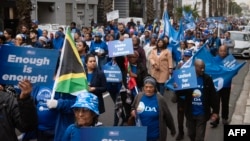Members of South Africa's main opposition party took to the streets Wednesday in Cape Town to protest a new law that allows racial quotas in the workplace, saying it will discriminate against minority whites, Indians and mixed-race people.
Protester Astrid-Anne Abrahams is part of the mixed-race minority group classified in South Africa as "colored."
"We already have so little jobs. There are a lot of people … not working, and now they still want to marginalize us — colored and whites and Indians," Abrahams said.
The South African government says the law is necessary because most companies are not following through on pledges to transform their workforce by hiring more qualified Black South Africans.
While Black people make up an estimated four-fifths of the more than 60 million people in South Africa, the latest employment equity report from the government shows they hold only 16.9% of top management positions.
Protester Topollo Mokhathi, a Democratic Alliance councillor in the city of Cape Town who is classified as Black, says the existing employment equity legislation in place since 1998 obviously hasn't worked for everyone.
"Instead, we have found that there's a certain grouping that benefited. It's a small elite grouping," Mokhathi said.
Earlier this year, President Cyril Ramaphosa signed into law the amendment to the Employment Equity Act of 1998, giving the minister of employment the power to set targets for certain sectors. Companies that employ more than 50 people will be affected.
Such companies must ensure within five years that they meet targets, which are aimed at boosting Black representation in positions that require specialized skills, professional degrees or management responsibilities.
The details of which targets will be set for which sector and province were open to public comment and are still being finalized.
Labor lawyer Puke Maserumule says it's good to have laws, but government must work to ensure compliance.
"And of course, on the part of employers, the will to implement — perhaps willingly — without legal duress. Because let's be honest, it's in the interest of everybody — Black, white, yellow, green — that we don't have the levels of differentiated incomes that we have, the levels of poverty. It's just a recipe for disaster," Maserumule said.
The opposition Democratic Alliance says the law will inevitably cost some people their jobs based on skin color.
The director of employment equity in the Department of Labor, Ntsoaki Mamashela, says no one will lose their job in order for companies to meet the targets.
But she says companies that do not comply or have a valid reason for not complying will be taken to labor court and could be fined up to 2% of their annual revenue.
Mamashela says a nationwide campaign is underway to explain the amendments to workers and bosses.





